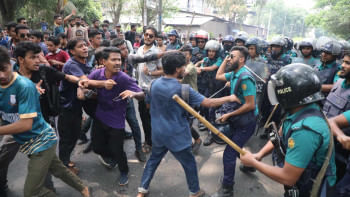Crime rate falls, probes make little headway
The overall law and order marked an improvement in 2007 except some stray incident as the country went through the state of emergency from the beginning of the year.
However, killings of Supreme Court lawyer advocate Sayma Khanum, two Rab members in Savar, a National Security Intelligence (NSI) official and a North South University (NSU) teacher in the city were some of the incidents that created sensation.
The rise of the dope gangs popularly known as "ogyan party" and "molom party" had also created tension among the people. But the law enforcement agencies launched a crackdown on them and apparently rounded off their activities by arresting the ringleader.
The law enforcement agencies also made breakthroughs in some bomb and grenade blast cases. But their failure was evident in several sensational cases including the biggest ever arms and ammo haul in Chittagong and seizure of huge ammunition and explosives in Bogra.
Workers' unrests in several readymade garments and jute industries and violence at different educational institutions also marked the period. The outburst of violence in educational institutions led the government to slap a curfew in all divisional headquarters to contain law and order.
The number of major criminal incidents showed a downtrend due to the state of emergency, which was declared on January 11. Though the number of cases filed in 2007 increased, police believe it happened as people felt free to make complaints. Around 1.31 lakh cases were filed nationwide in 2006 and about 1.57 lakh in 2007.
Police high-ups believe absence of political interference in home affairs, stop of politicisation in police department, neutral working environment, and providing due promotion also contributed to improved law and order.
Execution of six top leaders of outlawed Islamist outfit Jama'atul Mujahideen Bangladesh (JMB) also resulted in the law and order improvement. Inspector General of Police Nur Mohammad recently said an excellent situation has been prevailing in the country since the six top JMB leaders were executed.
Extra-judicial killings by law enforcers, especially by the Rapid Action Battalion (Rab) and police, also marked a significant downfall comparing to the previous years.
According to human rights organisation Odhikar, 290 people were killed in 'crossfire' or 'encounter' in Rab-police action in 2006 and 129 in 2007.
The year 2007 was successful for the law enforcers as they found out the motives and detected the attackers of some of the deadliest bomb and grenade blasts including that of the August 21 on an Awami League (AL) rally in 2004.
The law enforcers claim they succeeded as they could work neutrally and without any interference.
The long trend of harassment of people by police has also marked significant fall last year as the high-ups had taken a number of steps to check it.
Illegal arrests, issuance of threats to arrest, detaining people wrongfully and releasing later in exchange of money, unnecessarily taking arrestees into remand for illegal purpose were some of the significant forms of police harassment.
Organised criminal gangs 'Ogyan Party' and 'Molom Party' were serious headache for the law enforcers as they doped several people to death. But the law enforcers cracked down heavily on them and arrested Abdul Aziz, the gang's main coordinator.
Alarming spread of Yaba trade and its use appeared as a major concern for the law enforcers. However, a massive crackdown on the drug dealers, suppliers and users curbed Yaba trading and use significantly.
The crackdown by law enforcers, particularly by the Rab, resulted in the arrest of a number of people including businessmen and student and Yaba dealers. Rab netted drug baron Amin Huda and unearthed his Yaba producing factory.
The year was a new experience for the police as their high-ups took all-out measures to improve the image of the force. As many as 12,365 policemen suffered different terms of punishment on different charges and 182 of them even lost their jobs.
UNREST IN GARMENT AND JUTE MILLS
Several incidents of clashes between workers of different jute mills and law enforcers in Chittagong, Khulna and Narayanganj left one killed and several hundred including policemen injured.
Workers of a number of garment factories in Tejgaon and Mirpur in the capital and in Gazipur also staged demonstrations, blockaded roads and highways and clashed with police to press home their demands.
DU VIOLENCE
Thousands of students on Dhaka University (DU) campus fought pitched battles with police in the night of August 20 demanding removal of an army camp. Much of Dhaka city later turned into a battleground as students continued clashing with police in the fallout from the beating of three DU students by army personnel.
In the aftermath of the violence the government slapped a curfew in all divisional headquarters.
EXECUTION OF SIX TOP MILITANTS
JMB supremo Abdur Rahman, his deputy Bangla Bhai and four other top leaders were executed on March 29 for killing two Jhalakathi judges on November 14, 2005.
The executions mark in all probability the end of the country's first overt militancy campaign that rattled the nation through a series of coordinated blasts and suicide bombings in 2005.
Abdur Rahman was hanged at Comilla jail, Bangla Bhai and Abdul Awal, JMB Majlish-e-Shura (highest decision-making body) members and Rahman's son-in-law, at Mymensingh jail.
The outfit's military commander and Rahman's youngest brother Ataur Rahman Sunny and suicide bomber Iftekhar Hasan Mamun were executed at Kashimpur jail in Gazipur, while another Shura member Khaled Saifullah was hanged to death at Pabna jail.

 For all latest news, follow The Daily Star's Google News channel.
For all latest news, follow The Daily Star's Google News channel. 



Comments